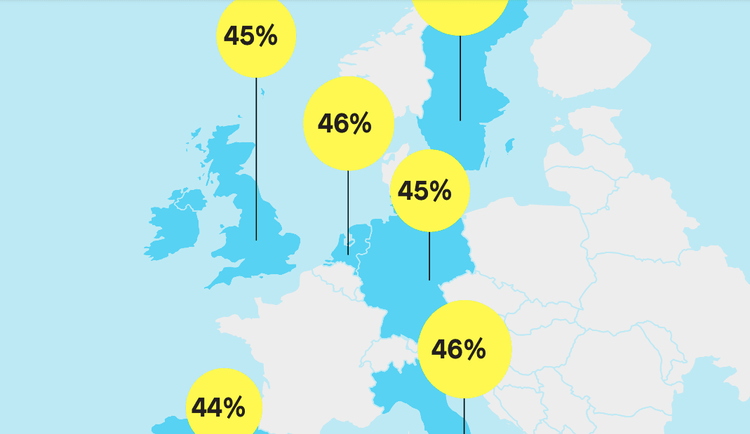HR Study: Half Your Staff Are Thinking of Leaving - Here´s Why

hr-study-half-your-staff-thinking-leaving.png
Behöver du hjälp att välja system?
Starta guidenThe bad news? Some 46% of employees in Europe’s small and medium-sized companies plan to look for a new job in the next 12 months. That number alone shows a very clear change in the needs, wants and opportunities at hand for top talent.
Now, onto the good news: We delved into why more and more employees are thinking about quitting their jobs, and what factors would help them stay. Teaming up with the market research institute Opinium, Personio conducted a pan-European* study to dig deeper.
In the process, we discovered some eye-opening insights – alongside a host of possible solutions and strategies for organisations. The following is what we found.
Employees Are on the Move – But Why?
Overall, 90% of HR managers in European SMEs report that their company suffers from skills shortages, recruitment problems or a lack of staff retention.
But, why? In the last two pandemic-impacted years, employees have reassessed their professional and personal values:
- 71% want more time for their families
- 71% want more work-life balance
- 68% want a higher salary
his showcases the need for organisations to not only focus on attracting new talent but also on the talent they already have in the company.
As Pete Cooper, Director of People Planning, at Personio puts it best: “For employers, the priority shouldn’t just be to stop people leaving, it needs to be about retaining and maintaining a motivated, productive and engaged workforce.”
Sidenote: The problems may stem from the top. Some 48% of leadership teams do not realise the scale of our current skills shortages (as per the HR managers surveyed).
The Top Reasons Why Employees are Leaving
Remote, hybrid, flexible – working during the pandemic is more challenging than ever. Some 32% of respondents see a stressful work environment as a reason to quit. But, too little praise and poor development opportunities also make employees think about changing jobs.
- 31% would quit because of a lack of appreciation of their work
- 30% would quit because of a lack of promotion opportunities
Stagnating career development seems to be a particularly sore point. Some 37% of employees say the pandemic has affected their careers, while 35% think they have missed out on a promotion they were entitled to. That can be a significant blow to morale.
What Does This All Mean?
“HR and leaders across organisations need to think very carefully about the inclusion of employees working remotely, in a hybrid fashion or fully in the office when it comes to careers and promotions,” says Perry Timms, Chief Energy Officer, People and Transformational HR Ltd.
This is especially important as the propensity to change roles is particularly high among remote workers (53%). This could be because remote workers are less loyal to their employers or have more options due to location-independent work.
Kontakta oss
Staying Is About More Than Money
Admittedly, a salary increase is a good reason for more than half of the employees (54%) to stay with their current employer. But, more appreciation is also high on the list (35%), as are a good work-life balance and benefits (30%).
Our study finds that as many as 96% of HR teams make use of retention strategies. For these to be effective, though, a holistic view needs to be taken of employee priorities, potential reasons for leaving and the factors that would help retain staff.
What Does This All Mean?
Our Chief People Officer, Ross Seychell pretty much sums it up: “Great quality performance and career discussions are crucial. They not only highlight personal pull and push factors, but also help leaders identify overworked or frustrated employees and ensure they get the appreciation and career progression opportunities they need.”
Rethinking Performance Post Pandemic
Great performance management helps employees advance professionally, makes it easy for them to feel appreciated and to realise their own potential.
However, only 51% of employees say that appraisals are fair in their organisation. Moreover, our findings showed that supervisors have not been giving enough feedback regularly since the pandemic.
What Does This All Mean?
HR teams need to make the performance appraisal process fair, regular and suited to the new world of work. Especially when employees work remotely and are more disconnected from the workplace, exceptional inclusion is table stakes.
HR Teams Can Be Key Players in Success
In order to grow sustainably, SMEs need to pull out all the stops to retain their existing talent and hire the best candidates. Your HR function needs to prioritise sustainable talent acquisition and retention.
Currently, two things are missing: one in six HR respondents (18%) do not have the time or the resources to drive and manage more strategic tasks.
5 Key Takeaways From the Study
- Employees’ Values Have Changed: “Soft” factors such as work-life balance have become even more critical.
- HR Teams Lack C-Level Support: Managers are underestimating the shortage of skilled workers and are not providing enough resources.
- Stagnating Career Development Drives Attrition: HR needs to rethink and create new opportunities for performance and development to thrive.
- Performance Management Needs Improvement: Many employees feel that appraisals and growth conversations are simply not fit for purpose.
- Remote Workers Are More Willing to Switch: They would especially benefit from fair, transparent performance and feedback processes.
*Study countries: Germany, UK/Ireland, Spain, the Netherlands, Italy and Sweden.
Blog post by: Personio

Equality & Diversity In The Workplace: Definition, Tips, and Strategies
HR system